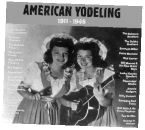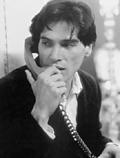Shopping for a hardcore music lover, one who seems to have every record you could conceive of, can be daunting. The impulse is to just buy a gift certificate and send them on their way. But if you really want to have some fun, a good, hard dig through the CD stacks can be as ear-opening for them as it is eye-opening for you.
Take, for instance, American Yodeling 1911-1946, on the exceptional German label Trikont. (The label’s Web site is www.trikont.de; an easier buying bet is New York specialty shop Other Music, www.othermusic.com, a good source for many of the titles herein.) A 26-track compilation whose focus, despite its title, is the ’30s and ’40s (the 1911 of the title represented by the final track, George P. Watson’s “Sleep, Baby, Sleep”), American Yodeling is stuffed with names familiar to any student of roots music: Delmore Brothers, Bill Monroe and His Bluegrass Boys, Jimmie Rodgers, Bob Wills and His Texas Playboys, Roy Rogers, the Carter Family, Sons of the Pioneers. What really makes the collection fly, though, is that the obscurities are as much fun as the well-known stuff. My favorite is “The Yodelin’ Teacher,” by Goebel Reeves (the Texas Drifter), which opens with half a minute of wild vocal trilling before someone else cuts in: “Say, boy, what in the world do you think you’re doin’?”
“I’m yodelin’. What do you think I’m doin’?”
“You was doin’ what?“
“I said I was yodelin’. Yodelin’!”
“I heard that was called yewdelin‘.”
“Well, you heard wrong, ’cause it’s called yodelin’, that’s what ’tis. I was doin’ it and I reckon I know.”
“Well, what is that, anyway?”
“Well, it’s a musical thing that was discovered over in the Alps somewhere, where the Swiss people lives, you know, where they make that Swiss cheese?”
“Man, you know everything, don’t you?”
“Well, sho’, I worked for the white folks in a tent one time, and there’s a show in the tent . . .”
And on into a full-blown yodeling etymology.
American Yodeling isn’t the only Trikont title deserving of mention here, either. They’re also responsible for the fine Down and Out: The Sad Soul of the Black South, a collection of obscure blues and soul songs so gloriously depressing they could drive Prozac out of business (like Ede Robin’s “Dead,” whose protagonist decides to open her veins with a razor and which ends with the singer moaning, “Lord, I’m bleeding . . .”). Trikont also brings us La Paloma, a four-CD (so far) set that collects versions of the title song done by, among others, Elvis Presley, Charlie Parker, and Maria Callas, and the infamous 1938 radio broadcast “War of the Worlds.” (All titles are about $15—for imports, a steal.)
Of course, if you want to listen to the same song over and over again, why not go all the way and listen to the same sound in endless succession? This is the logic behind the astounding 500 Lock Grooves (RRR; about $20), a five-years-in-the-making sonic extravaganza. A vinyl record rather than a CD, its rules are simple: Drop the needle on any of the grooves (250 per side), and it’ll stay there until you pick the stylus up and put it down somewhere else. This is conceivably the longest album ever made, and what’s especially fun—aside from its room-clearing and lease-breaking capabilities—is trying to hear it all. Though many of the loops are various forms of pure noise, there are also beats, doorbells, dogs barking, children speaking, anything you can think of, and many of them coalesce into deliberately rhythmic shapes.
“Rhythmic,” of course, is techno’s m鴩er, and so for lots of folks, it’s “irritating.” Still, what separates Make ’em Mokum Crazy (Mokum; about $17) from 500 Lock Grooves is that its humor isn’t just intrinsic: Nothing sets off the lunatic signal at a party faster than happy-gabber (i.e., relentlessly upbeat, superfast techno) versions of “Hava Naquila” [sic] or “Happy Birthday” or such originals as “I Wanna Be a Hippy,” the latter of which, God help us all, actually made the Top Ten in several European countries. For techno fans who haven’t completely lost their sense of humor, it’s a good way to remember how much fun (and stupid) this stuff can be. And for techno fans who find this stuff anathema—lighten up, willya?
That’s what Ronald Thomas Clontle would want us to do. Unlike most rock critics, Clontle doesn’t bother trying to persuade you that his opinions aren’t wrong—he doesn’t even try to convince you he knows what he’s talking about. The Lawrence, Kansas, author of Rock, Rot or Rule, a 98-page tome consisting of nothing more than band names and one of three final judgments: “rock,” “rot,” or (you guessed it) “rule.” Except for the index, that’s it.
Of course, there are two things wrong with this scenario. One, Clontle’s sole promotional effort was a radio interview with Tom Scharpling of WFMU in East Orange, New Jersey. The other is that “Clontle” is a fictional character played by Superchunk drummer Jon Wurster. And as demonstrated in that interview, released on CD (with an altered conjunction) as Rock, Rot & Rule (Stereolaffs; about $15), Wurster played the character to the hilt, claiming that Madness invented ska (one listener reads him the track listing of The Birth of Ska Vol. 2: 1966-69; “Is it called ‘Our House’?” Clontle smugly interrupts), that Bush rules while Nirvana merely rocks, and that Neil Young rots (Clontle has only heard the likes of Landing on Water and American Dream) and Madonna rules, because “the people have decided her body of work is far better” than Young’s. As a prank-call joke, Rock, Rot & Rule buries the Jerky Boys; as a sendup of rock culture, it’s every bit as acute, and funny, as This Is Spinal Tap.
Speaking of satirical movies, few dismantled their targets with as much gusto as the Warner Bros. cartoons of the ’30s through the ’50s, and Bugs and Daffy fans owe it to themselves to check out how the sonic cues of soundtrack composer Carl Stalling and sound-effects maestro Treg Brown hold up on their own. The Carl Stalling Project Vol. 1 & 2 (both Warner Bros.; about $17) features the orchestral backings of many of your favorites; thanks to several generations of Saturday morning viewing, it’s at least as visually stimulating as any psychedelic rock. Rhino’s new Crash! Bang! Boom! The Best of WB Sound FX (about $17) suffers from a preponderance of dippy skits but pays Brown suitable homage with 98 tracks in 42 head-spinning minutes. It’s at least as disruptive as 500 Lock Grooves—and a lot more accessible.
Just as welcoming is the year’s loveliest—and unlikeliest—theme album. On Might as Well: The Persuasions Sing Grateful Dead (Grateful Dead/Arista; about $17), the long-running doo-wop quintet lends its glorious lung power to a fine batch of Jerry Garcia-Robert Hunter copyrights, helped by “family” members like Dead keyboardist Vince Welnick, Old and In the Way member Peter Rowan, and Grateful Dead Hour host David Gans. The gorgeous versions of “Sugaree” and “Ripple” not only render moot any objections that the Dead’s songs only sound good when you’re on drugs, they make the group’s organic aura palpable to those who can’t stand the smell of patchouli—a one-of-a-kind achievement indeed.
Michaelangelo Matos is a staff writer at Seattle Weekly.








